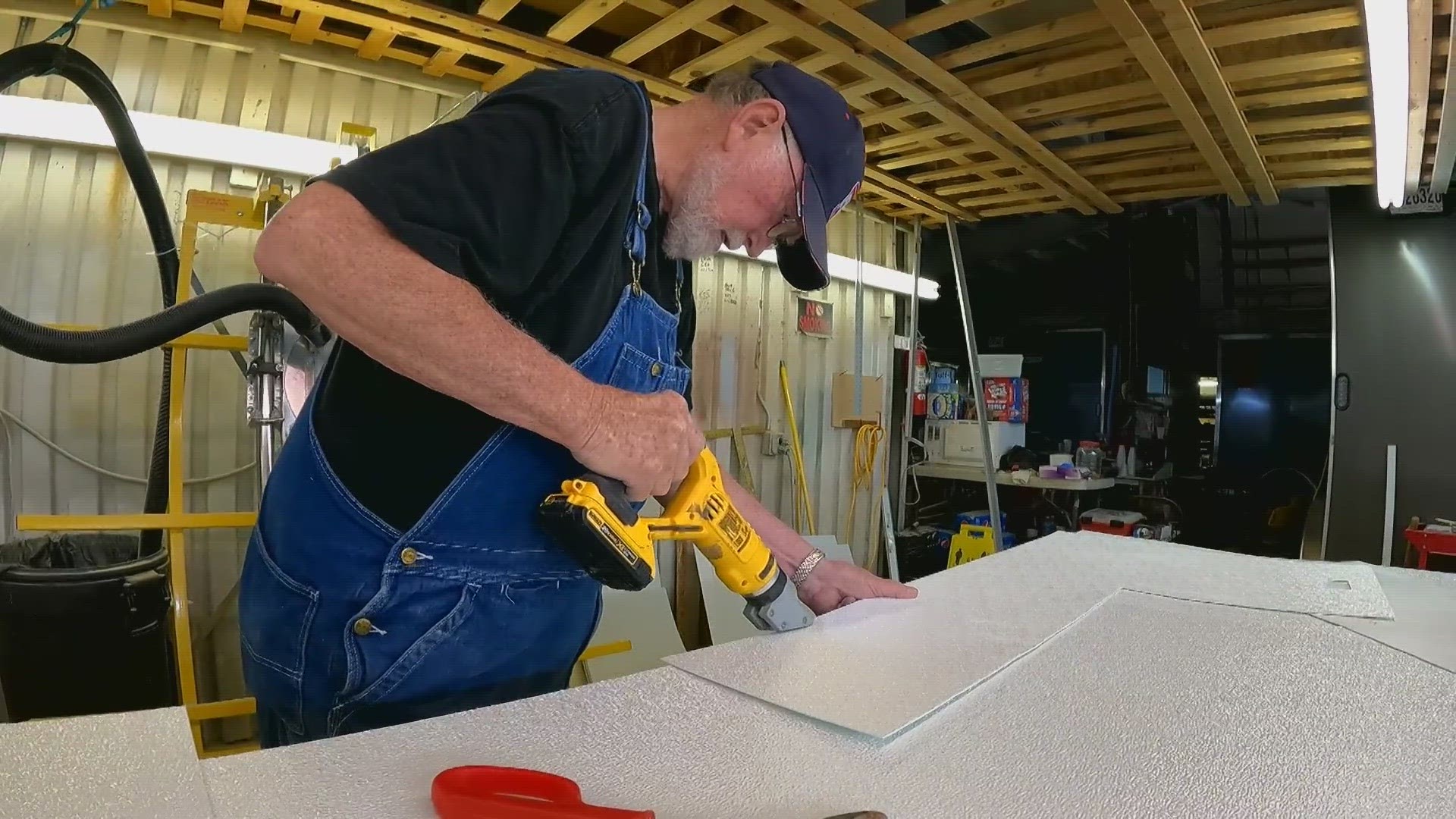BOOTHBAY, Maine — In a cavernous commercial workshop, formerly used for a painting and construction business, a small team of retired veterans works to save other veterans’ lives.
They do it by transforming common, enclosed utility trailers into what are essentially small, moveable bedrooms.
For homeless veterans, those trailers provide safety, security, and comfort at a time when those essentials may have disappeared.
“We took one to one place,” John Hargreaves, who does many of the trailer deliveries, said. “And the guy come out and said I don’t know if I’ll be able to sleep in that bed tonight. I haven’t slept in a bed in six years. You know that gets you, and shows you’re doing something, actually helping people.”
The project is called Boothbay V.E.T.S.—short for Veterans Emergency Temporary Shelters— and began three and a half years ago with an idea from Ed Harmon and Arthur Richardson, who met through the local American Legion post. Harmon knew how to build and repair camper trailers and Richardson knew electrical and other construction work.
They built a prototype, showed it off at the legion hall, and started raising money to build more. The idea caught on.
Harmon says they now have 21 completed units being used around the state, and six new ones are under construction.
The work is all done by volunteers, and everything is paid for with donations.
But as he sat in the doorway of a V.E.T.S. unit waiting to be delivered, Harmon said the current need for shelters far outstrips the supply.
“In the last five weeks, I’ve had phone calls, I could have 50 more units out in the state, but I don’t have them.”
The current estimate by the Veterans Administration and veteran advocates is that there are more than 200 homeless veterans in the state. Those who qualify for VA disability benefits get monthly checks, but veterans say the statewide housing shortage means there may not be any place to rent. The V.E.T.S. trailers are designed for those situations, to be temporary housing to get veterans off the street until more permanent homes can be found.
The units are insulated, heated, and electrified, with a bed and table built in as well as a refrigerator and microwave oven. They’re designed to be plugged into a building for power, at a location where the veteran can also access a bathroom and shower facilities. Legion halls, campgrounds, and even a few homes have been serving as locations for V.E.T.S. trailers.
“So the vets have a place to sleep, they can be safe and get a good night’s sleep so that they can have some chance of rehabilitation,” retired dentist and veteran Chris Goodwin said as he worked on installing the interior panels of a new unit.
Dondi Soucy had never heard of the V.E.T.S. program until he needed its help.
Soucy is disabled from his time in the Army and lost his adult son to a drug overdose last year. While despondent from the death, Soucy said he was then evicted from his apartment after he complained to police of drug activity in the building.
“So I’m in panic mode. Where am I going to live? And I’ve got a dog,” Soucy recalled.
The Veterans Administration homeless team, as Soucy calls it, connected him with Harmon.
"And he said, 'We got you. Anything we can do to take care of our brothers and sisters, that’s what we’re gonna do.'"
Soucy moved into a V.E.T.S. trailer in a Brunswick campground. He said it protected him and his dog, Sammy, from the seemingly endless summer rains, and helped provide security and comfort at a time he had been considering suicide.
Soucy stayed there for two months until he was connected with a woman in Hiram who had an empty mobile home and wanted to help veterans. Soucy moved in, paying rent, and the portable shelter was taken back to Boothbay, cleaned, and handed off to help another veteran.
“It feels good,” Arthur Richardson of how their creations are helping veterans, said. “Real good. It's really sad when you deliver one and they break down in tears.”
The vets who are building the units say they get a lot of satisfaction from the all-volunteer effort.
For some, like Harmon, it goes beyond that.
While measuring for another piece of interior panel, the Vietnam combat veteran said the work and the mission of helping homeless veterans is therapy for him, from the memories of that war.
“I did six tours in Vietnam. I was not a nice person,” he explained. “This is my device to stay alive. My therapy is to help others.”
To keep providing that help, however, Boothbay V.E.T.S. needs more donations. Harmon says it costs roughly $12,000 to buy and build one of the mobile units. They’re hoping more Maine residents, businesses, and groups will understand the need and donate.
“We can’t build them fast enough,” volunteer Chris Goodwin said. "Because the homeless situation for all people, including vets, is very serious in the state.
The group is also hoping for separate donations to help expand the workshop building. More space, Harmon says, will let them build the units more efficiently and recruit more volunteers to do the work.
Veterans like Soucy say the project is working. Or him, says Soucy, that help came at a critical time and may have saved his life.
“That’s why I’m talking to you today, that changed my whole (life)… that’s another reason I’m here."
Harmon says stories like that inspire them to keep going.
“We are in it to save a life and there is no price on a life, no price on a life, especially a veteran."
As he sat on the steps of his new, long-term home, Soucy said he was grateful.
“Until the day I die, those three guys will always be in my heart."

